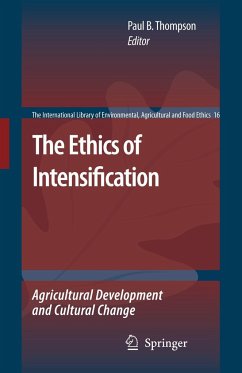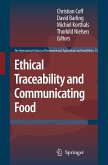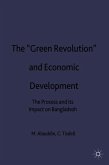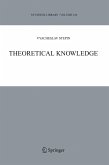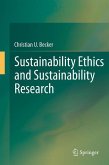The Ethics of Agricultural Intensification: An Interdisciplinary and International Conversation Paul B. Thompson and John Otieno Ouko_ Global agriculture faces a number of challenges as the world approaches the second decade of the third millennium. Predictions unilaterally indicate dramatic increases in world population between 2010 and 2030, and a trend in developing countries toward greater consumption of animal products could multiply the need for prod- tion of basic grains even further. Although global food production in 2000 was estimated to be adequate for the existing population, hunger and malnutrition are persistent problems that have led decision makers to recognize that increasing food production in specific regions may be the most effective way to address food se- rity for impoverished peoples. At the same time, there will need to be policy adju- ments that improve poor people's access to current food supplies without simultaneously undercutting the ability of local producers to obtain needed cash income. What is more, the uncertain effects of global climate change on agricultural ecosystems complicate planning for this process, while poorly understood processes of globa- zation create additional unknowns from the side of social systems. In short, despite surpluses in many parts of the developed world, finding ways to increase food p- duction on both selected regional and a total global basis remains a priority for many farmers, policy makers and agricultural researchers.
From the reviews:
"The book helpful in the multiple overviews it provided of the major fault lines that exist in mainstream ethical theory. ... for anyone who requires an accessible survey of recent ethical and political controversies in agriculture. ... it is rich enough in detail and theoretical depth that I could also recommend it as a textbook for higher level university courses in fields that deal with such issues in greater detail. ... to all those interested in the subject of the philosophy of technology ... ." (James B. Gerrie, Journal of Agricultural and Environmental Ethics, Vol. 22, 2009)
"The book helpful in the multiple overviews it provided of the major fault lines that exist in mainstream ethical theory. ... for anyone who requires an accessible survey of recent ethical and political controversies in agriculture. ... it is rich enough in detail and theoretical depth that I could also recommend it as a textbook for higher level university courses in fields that deal with such issues in greater detail. ... to all those interested in the subject of the philosophy of technology ... ." (James B. Gerrie, Journal of Agricultural and Environmental Ethics, Vol. 22, 2009)

